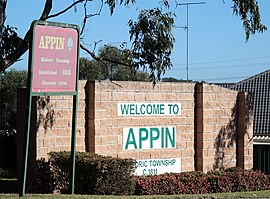Appin, New South Wales
|
Appin New South Wales |
|||||||||||||
|---|---|---|---|---|---|---|---|---|---|---|---|---|---|

Northern entry to Appin
|
|||||||||||||
| Coordinates | 34°12′S 150°47′E / 34.200°S 150.783°ECoordinates: 34°12′S 150°47′E / 34.200°S 150.783°E | ||||||||||||
| Population | 1,803 (2011 census) | ||||||||||||
| Postcode(s) | 2560 | ||||||||||||
| Elevation | 150 m (492 ft) | ||||||||||||
| Location |
|
||||||||||||
| LGA(s) | Wollondilly Shire | ||||||||||||
| Region | Macarthur | ||||||||||||
| State electorate(s) | Wollondilly | ||||||||||||
| Federal Division(s) | Macarthur | ||||||||||||
|
|||||||||||||
| Appin Massacre | |||||||
|---|---|---|---|---|---|---|---|
|
|||||||
| Belligerents | |||||||
| British colonists | Dharawal people | ||||||
| Commanders and leaders | |||||||
| Governor Macquarie | |||||||
| Casualties and losses | |||||||
| At least 14 | |||||||
Appin is a town in the Macarthur Region of New South Wales, Australia in Wollondilly Shire. It is situated about 16 kilometres south of Campbelltown and 35 kilometres north west of Wollongong.
Appin is in the lands of the Dharawal people.
"During the Dreaming a great fire swept through the land. Wiritjiribin led the people to sanctuary in a cool green gully
which had been missed by the fire, under the rocky cliffs of a gorge south of Appin. Those who had perished in the fire were reincarnated as animals and Wiritjiribin appeared as a lyrebird, which became the clan’s totem, a symbol of peace and caretaker of the Land of Gawaigl, an area which became a meeting place for Peoples from all over the east coast of
European settlement in the Appin district was prohibited for some years; Appin was part of the 'Cowpastures' where a small herd of cattle had established themselves, having escaped from the Sydney Cove settlement. To protect these and help feed the colony, Governor Macquarie ordered 'No person to hunt or travel into the Cowpastures without licence under penalty of death'.
Naturalist George Caley had visited the area in 1807 exploring 'from Prospect to the upper waters of George's River and the Cataract and Cordeaux Rivers' and reporting his findings. Settlement began in 1811 with a 1,000-acre (4.0 km2) land grant by Governor Macquarie to William Broughton, who had arrived with the First Fleet. For the next five years, smaller grants of 40 to 150 acres (0.61 km2) were made to a score or so of others, former soldiers, emancipated convicts. Governor Macquarie was pleased to give 'The District of Appin' its name, after Appin, in the Scottish West Highlands where his wife, Elizabeth, was born.
Mrs Allan McPherson, visiting circa 1856, wrote:
"The next morning was fine and bright, and with somewhat better spirits we set out again, but the roads were heavy, and our progress consequently not very rapid, so that it was one or two o'clock before we reached "Appin," a small village, the last resting place on the Sydney side of Mount Keera. As it was too late to attempt crossing the mountain--at all times a formidable undertaking--that evening, we were obliged to make up our minds to stay here. We were not by this time very difficult to please in the way of accommodation, but it seemed doubtful if we should meet with any in this out-of-the-way little place. At last the landlord of a little inn took compassion on us, and let us in, though giving us to understand it was quite as a favour, for he was giving up his business that week, and his house was in a great state of confusion. I afterwards learnt we owed the accommodation, such as it was, to the compassion of the landlord's wife, who chose to weave a little romance about us to the effect that we were a newly married couple, and who was not a little disappointed when I informed her I had been married several years, and had three children! I must be excused if my recollections of Appin are not very favourable, for at this half-dismantled little inn we were detained three days by incessant torrents of rain, such as I had hardly ever witnessed before, even in the colony. What to do with ourselves we really hardly knew. We had neither writing nor drawing materials, nor were they procurable…"
...
Wikipedia

